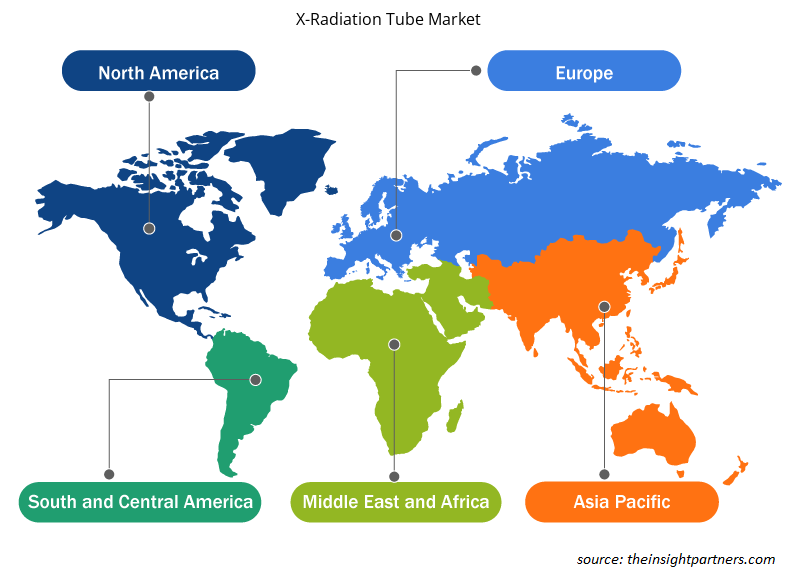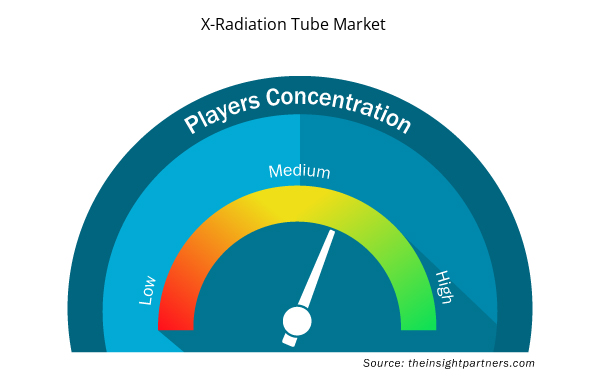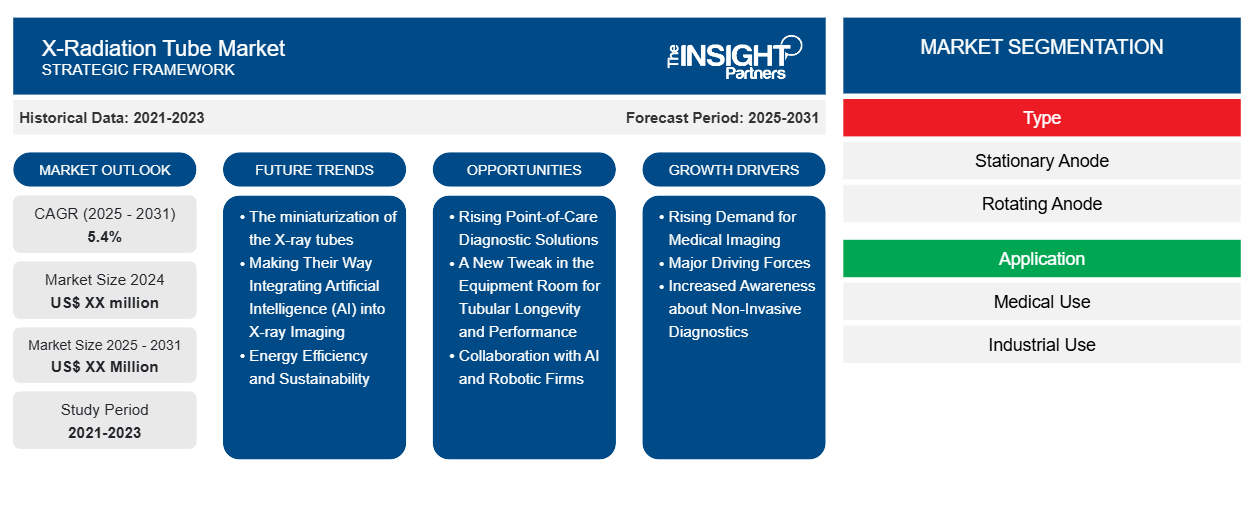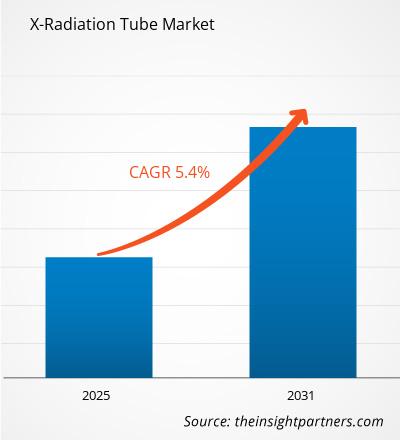Es wird erwartet, dass der Markt für Röntgenröhren von 2024 bis 2031 eine durchschnittliche jährliche Wachstumsrate (CAGR) von 5,4 % verzeichnet, wobei die Marktgröße von XX Millionen US-Dollar im Jahr 2024 auf XX Millionen US-Dollar im Jahr 2031 anwächst.
Der Bericht ist nach Typ (stationäre Anode, rotierende Anode) segmentiert. Der Bericht präsentiert außerdem Analysen basierend auf der Anwendung (medizinische Verwendung, industrielle Verwendung). Die globale Analyse ist weiter auf regionaler Ebene und in den wichtigsten Ländern aufgeschlüsselt. Der Bericht bietet den Wert in USD für die oben genannte Analyse und die Segmente.
Zweck des Berichts
Der Bericht „X-Radiation Tube Market“ von The Insight Partners soll die aktuelle Situation und das zukünftige Wachstum sowie die wichtigsten treibenden Faktoren, Herausforderungen und Chancen beschreiben. Dies wird verschiedenen Geschäftspartnern Einblicke geben, wie zum Beispiel:
- Technologieanbieter/-hersteller: Um die sich entwickelnde Marktdynamik zu verstehen und die potenziellen Wachstumschancen zu kennen, damit sie fundierte strategische Entscheidungen treffen können.
- Investoren: Durchführung einer umfassenden Trendanalyse hinsichtlich der Marktwachstumsrate, der finanziellen Marktprognosen und der Chancen entlang der Wertschöpfungskette.
- Regulierungsbehörden: Zur Regulierung von Richtlinien und Überwachungsaktivitäten auf dem Markt mit dem Ziel, Missbrauch zu minimieren, das Vertrauen der Anleger zu bewahren und die Integrität und Stabilität des Marktes aufrechtzuerhalten.
Röntgenröhre Marktsegmentierung
Typ
- Stationäre Anode
- Rotierende Anode
Anwendung
- Medizinische Verwendung
- Industrielle Nutzung
Passen Sie diesen Bericht Ihren Anforderungen an
Sie erhalten kostenlose Anpassungen an jedem Bericht, einschließlich Teilen dieses Berichts oder einer Analyse auf Länderebene, eines Excel-Datenpakets sowie tolle Angebote und Rabatte für Start-ups und Universitäten.
- Holen Sie sich die wichtigsten Markttrends aus diesem Bericht.Dieses KOSTENLOSE Beispiel umfasst eine Datenanalyse von Markttrends bis hin zu Schätzungen und Prognosen.
Wachstumstreiber auf dem Röntgenröhrenmarkt
- Steigende Nachfrage nach medizinischer Bildgebung: Da die steigende Nachfrage nach medizinischen Bildgebungsgeräten die Nachfrage nach ihnen antreibt, wird der Röntgenröhrenmarkt allmählich von diesem Faktor beeinflusst. Alle diese diagnostischen Bildgebungstechnologien, d. h. Röntgenbildgebung, CT-Scans und Fluoroskopie, sind für die Früherkennung und Diagnose einer Vielzahl von Erkrankungen von Knochenverletzungen bis hin zu Krebs erforderlich. Die weitere Entwicklung und Ausweitung der Gesundheitssysteme weltweit, insbesondere in den Schwellenländern, bedeutet einen Bedarf an solchen weit verbreiteten Bildgebungswerkzeugen und damit eine erhöhte Nachfrage nach Röntgenröhren.
- Wichtige Antriebskräfte: Ein innovatives Design und eine innovative Funktionsweise der Röntgenröhre haben die Entwicklung auf dem Markt weiter vorangetrieben. Mit der Einführung digitaler Radiographiesysteme (DR) und Computertomographiescanner (CT) beispielsweise haben sich Qualität und Effizienz der medizinischen Bildgebung deutlich verbessert. Dies führte zur Herstellung kompakter, energieeffizienter und leistungsstarker Röntgenröhren. Einige Innovationen bei den Materialien, aus denen die Röhrenkomponenten bestehen, wie z. B. verbesserte Anoden und Kathoden, haben zu einer noch besseren Haltbarkeit und Leistung geführt.
- Erhöhtes Bewusstsein für nichtinvasive Diagnostik: Das Bewusstsein für den Einsatz nichtinvasiver Diagnostik im medizinischen Bereich ist weiter gewachsen, insbesondere bei Krebs, Herz-Kreislauf-Erkrankungen und Skeletterkrankungen. Daten über die inneren Organe werden mithilfe nichtinvasiver Mittel durch Röntgenbildgebung erfasst, was diese zu einer bevorzugten Wahl unter den verschiedenen verfügbaren Diagnosemodalitäten macht. Da das Bewusstsein für die Vorteile nichtinvasiver Diagnostik wächst, führt dies zu einer höheren Nachfrage nach Röntgenröhren für medizinische Bildgebungsanwendungen.
Zukünftige Trends auf dem Röntgenröhrenmarkt
- Die Miniaturisierung der Röntgenröhren: Solche Merkmale einer Röntgenröhre sind hauptsächlich die Miniaturisierung. Es besteht ein Bedarf an tragbaren Diagnoseinstrumenten, und die Hersteller konzentrieren sich daher darauf, kleinere und leichtere Röntgenröhren herzustellen, die eine gute Leistung durch klare Bilder liefern. Dieser Trend ist auch bei Point-of-Care-Diagnoseanwendungen und bei mobilen Röntgensystemen zu beobachten, die leichte, kompakte Geräte erfordern, die in verschiedenen Umgebungen eingesetzt werden können, darunter in Notaufnahmen, Krankenwagen oder abgelegenen Gebieten.
- Die Integration künstlicher Intelligenz (KI) in die Röntgenbildgebung ist auf dem Vormarsch: Es sollte mehr als nur traditionelle Bildgebungssysteme geben; Röntgenbildgebungssysteme werden an die Einbindung von KI in ihre Anwendung gebunden sein. Die Möglichkeiten der Röntgenröhre werden die Automatisierung des Bildanalyseprozesses stark betonen, wodurch die Diagnose die Reduzierung menschlicher Fehler verbessert. Der Schwerpunkt wird auf der Entwicklung von KI-Algorithmen liegen, die Symptome in Röntgenbildern erkennen oder Röntgenbilder analysieren, um Krankheiten wie Tumorbildungen oder Knochenbrüche zu erkennen. Dies würde wiederum neue Möglichkeiten innerhalb von Bildgebungssystemen eröffnen, mit denen Radiologen Erkrankungen viel effizienter und genauer identifizieren und so die Patientenergebnisse durch eine bessere Gesundheitsversorgung verbessern können.
- Energieeffizienz und Nachhaltigkeit: In allen Industriezweigen weltweit wird Nachhaltigkeit und Umweltverantwortung berücksichtigt. Daher wird Energieeffizienz als wichtige Voraussetzung für medizinische Geräte angesehen. Hersteller von Röntgenröhren haben ihre Designanstrengungen verstärkt, um immer energieeffizientere Röhren zu entwickeln, die bei geringerem Stromverbrauch gute und zuverlässige Bilder liefern. Bei der Herstellung dieser Röntgenröhren wird Wert auf umweltfreundliche Materialien sowie Elektrifizierung gelegt, um eine nachhaltigere Medizingeräteindustrie zu erreichen.
Marktchancen für Röntgenröhren
- Aufkommende Point-of-Care-Diagnostiklösungen: Da der Schwerpunkt zunehmend auf Point-of-Care-Diagnostik liegt – also auf abgelegenen Gebieten und Notaufnahmen – kann der Markt für Röntgenröhren auf diese Gebiete ausgeweitet werden. Tragbare, einfach zu bedienende Röntgengeräte mit miniaturisierten Röntgenröhren werden heute mehr denn je gefragt sein. Diese tragbaren Diagnoselösungen ermöglichen es Krankenhäusern und medizinischem Personal, die Bildgebung vor Ort zu beschleunigen, um die Patientenversorgung und die Diagnoseeffizienz zu verbessern. Ein solches Szenario bietet Herstellern weitere Möglichkeiten, Innovationen einzuführen und einen aufkommenden Trend zu nutzen.
- Eine neue Optimierung im Geräteraum für Langlebigkeit und Leistung der Röhren: Die Krankenhäuser und medizinischen Zentren haben alle ihre Bemühungen auf kostengünstige, langlebige Wartungsgeräte gerichtet. Als Ergebnis wurden Röntgenröhren mit längerer Lebensdauer und höherer Effizienz erfunden. All diese Dinge werden im Studentenkrankenhaus zum Einsatz kommen. All diese Innovationen im Bereich der Krankenhäuser und medizinischen Zentren werden sich durch verbesserte oder effizientere Patienten- und Benutzerbetreuung auszahlen. Dies bietet den Herstellern auch die Möglichkeit, neben einer hohen Leistungseffizienz auch langlebige Röhren mit minimalen Wartungskosten herzustellen. Solche Forschung und Entwicklung im Bereich langlebiger Röntgenröhren könnte Unternehmen zu Marktführern machen.
- Zusammenarbeit mit KI- und Roboterfirmen: Das Wachstum der KI in der medizinischen Diagnostik und der Roboter-Gesundheitsfürsorge bedeutet sogar gute Nachrichten für den Röntgenröhrenmarkt. Es finden beträchtliche Geschäfte zwischen Unternehmen statt, die diese KI-Systeme bauen, und Herstellern von Röntgengeräten. Durch die Verknüpfung von KI-gestützten Entscheidungsunterstützungssystemen mit hochmodernen Röntgentechnologien könnten sogar hochautomatisierte und präzise Diagnosewerkzeuge geschaffen werden, was den Bedarf an Hochleistungsröntgenröhren weiter erhöhen würde.
Regionale Einblicke in den Markt für Röntgenröhren
Die regionalen Trends und Faktoren, die den Röntgenröhrenmarkt im Prognosezeitraum beeinflussen, wurden von den Analysten von Insight Partners ausführlich erläutert. In diesem Abschnitt werden auch die Marktsegmente und die Geografie von Röntgenröhren in Nordamerika, Europa, im asiatisch-pazifischen Raum, im Nahen Osten und Afrika sowie in Süd- und Mittelamerika erörtert.

- Erhalten Sie regionale Daten zum Röntgenröhrenmarkt
Umfang des Marktberichts über Röntgenröhren
| Berichtsattribut | Details |
|---|---|
| Marktgröße im Jahr 2024 | XX Millionen US-Dollar |
| Marktgröße bis 2031 | XX Millionen US-Dollar |
| Globale CAGR (2025 - 2031) | 5,4 % |
| Historische Daten | 2021-2023 |
| Prognosezeitraum | 2025–2031 |
| Abgedeckte Segmente | Nach Typ
|
| Abgedeckte Regionen und Länder | Nordamerika
|
| Marktführer und wichtige Unternehmensprofile |
|
Marktteilnehmerdichte für Röntgenröhren: Auswirkungen auf die Geschäftsdynamik verstehen
Der Markt für Röntgenröhren wächst rasant, angetrieben durch die steigende Nachfrage der Endnutzer aufgrund von Faktoren wie sich entwickelnden Verbraucherpräferenzen, technologischen Fortschritten und einem größeren Bewusstsein für die Vorteile des Produkts. Mit steigender Nachfrage erweitern Unternehmen ihr Angebot, entwickeln Innovationen, um die Bedürfnisse der Verbraucher zu erfüllen, und nutzen neue Trends, was das Marktwachstum weiter ankurbelt.
Die Marktteilnehmerdichte bezieht sich auf die Verteilung von Firmen oder Unternehmen, die in einem bestimmten Markt oder einer bestimmten Branche tätig sind. Sie gibt an, wie viele Wettbewerber (Marktteilnehmer) in einem bestimmten Marktraum im Verhältnis zu seiner Größe oder seinem gesamten Marktwert präsent sind.
Die wichtigsten auf dem Markt für Röntgenröhren tätigen Unternehmen sind:
- BMI Biomedical International
- Control-X Medical, Ltd.
- Toshiba-Elektron
- Varian Medical Systems, Inc.
- IAE.
Haftungsausschluss : Die oben aufgeführten Unternehmen sind nicht in einer bestimmten Reihenfolge aufgeführt.

- Überblick über die wichtigsten Akteure auf dem Markt für Röntgenröhren
Wichtige Verkaufsargumente
- Umfassende Abdeckung: Der Bericht deckt die Analyse von Produkten, Dienstleistungen, Typen und Endbenutzern des Röntgenröhrenmarktes umfassend ab und bietet einen ganzheitlichen Überblick.
- Expertenanalyse: Der Bericht basiert auf dem umfassenden Verständnis von Branchenexperten und Analysten.
- Aktuelle Informationen: Der Bericht stellt durch die Abdeckung aktueller Informationen und Datentrends Geschäftsrelevanz sicher.
- Anpassungsoptionen: Dieser Bericht kann angepasst werden, um spezifische Kundenanforderungen zu erfüllen und die Geschäftsstrategien optimal anzupassen.
Der Forschungsbericht zum Markt für Röntgenröhren kann daher dabei helfen, die Branchensituation und Wachstumsaussichten zu entschlüsseln und zu verstehen. Obwohl es einige berechtigte Bedenken geben kann, überwiegen die allgemeinen Vorteile dieses Berichts tendenziell die Nachteile.
- Historische Analyse (2 Jahre), Basisjahr, Prognose (7 Jahre) mit CAGR
- PEST- und SWOT-Analyse
- Marktgröße Wert/Volumen – Global, Regional, Land
- Branche und Wettbewerbsumfeld
- Excel-Datensatz



Report Coverage
Revenue forecast, Company Analysis, Industry landscape, Growth factors, and Trends

Segment Covered
This text is related
to segments covered.

Regional Scope
North America, Europe, Asia Pacific, Middle East & Africa, South & Central America

Country Scope
This text is related
to country scope.
Häufig gestellte Fragen
Rotating Anode segment, by type, dominated the market in 2023.
The X-Radiation Tube Market is estimated to witness a CAGR of 5.4% from 2023 to 2031
The major factors driving the X-Radiation Tube market are:
1. Rising Demand for Medical Imaging
2. Increased Awareness about Non-Invasive Diagnostics
Rising Point-of-Care Diagnostic Solutions act as a opportunity for growth of the market in forecast period.
North America region dominated the X-Radiation Tube market in 2023.
Players operating in the market are BMI Biomedical International, Control-X Medical, Ltd., Toshiba Electron, Varian Medical Systems, Inc., IAE, GE, Varex Imaging Corporation, Lohmann X-Ray, Siemens Healthcare GmbH, Kailong Medical
Trends and growth analysis reports related to Life Sciences : READ MORE..
1. BMI Biomedical International
2. Control-X Medical, Ltd.
3. Toshiba Electron
4. Varian Medical Systems, Inc.
5. IAE.
6. GE
7. Varex Imaging Corporation
8. Lohmann X-Ray
9. Siemens Healthcare GmbH.
10. Kailong Medical
The Insight Partners performs research in 4 major stages: Data Collection & Secondary Research, Primary Research, Data Analysis and Data Triangulation & Final Review.
- Data Collection and Secondary Research:
As a market research and consulting firm operating from a decade, we have published and advised several client across the globe. First step for any study will start with an assessment of currently available data and insights from existing reports. Further, historical and current market information is collected from Investor Presentations, Annual Reports, SEC Filings, etc., and other information related to company’s performance and market positioning are gathered from Paid Databases (Factiva, Hoovers, and Reuters) and various other publications available in public domain.
Several associations trade associates, technical forums, institutes, societies and organization are accessed to gain technical as well as market related insights through their publications such as research papers, blogs and press releases related to the studies are referred to get cues about the market. Further, white papers, journals, magazines, and other news articles published in last 3 years are scrutinized and analyzed to understand the current market trends.
- Primary Research:
The primarily interview analysis comprise of data obtained from industry participants interview and answers to survey questions gathered by in-house primary team.
For primary research, interviews are conducted with industry experts/CEOs/Marketing Managers/VPs/Subject Matter Experts from both demand and supply side to get a 360-degree view of the market. The primary team conducts several interviews based on the complexity of the markets to understand the various market trends and dynamics which makes research more credible and precise.
A typical research interview fulfils the following functions:
- Provides first-hand information on the market size, market trends, growth trends, competitive landscape, and outlook
- Validates and strengthens in-house secondary research findings
- Develops the analysis team’s expertise and market understanding
Primary research involves email interactions and telephone interviews for each market, category, segment, and sub-segment across geographies. The participants who typically take part in such a process include, but are not limited to:
- Industry participants: VPs, business development managers, market intelligence managers and national sales managers
- Outside experts: Valuation experts, research analysts and key opinion leaders specializing in the electronics and semiconductor industry.
Below is the breakup of our primary respondents by company, designation, and region:

Once we receive the confirmation from primary research sources or primary respondents, we finalize the base year market estimation and forecast the data as per the macroeconomic and microeconomic factors assessed during data collection.
- Data Analysis:
Once data is validated through both secondary as well as primary respondents, we finalize the market estimations by hypothesis formulation and factor analysis at regional and country level.
- Macro-Economic Factor Analysis:
We analyse macroeconomic indicators such the gross domestic product (GDP), increase in the demand for goods and services across industries, technological advancement, regional economic growth, governmental policies, the influence of COVID-19, PEST analysis, and other aspects. This analysis aids in setting benchmarks for various nations/regions and approximating market splits. Additionally, the general trend of the aforementioned components aid in determining the market's development possibilities.
- Country Level Data:
Various factors that are especially aligned to the country are taken into account to determine the market size for a certain area and country, including the presence of vendors, such as headquarters and offices, the country's GDP, demand patterns, and industry growth. To comprehend the market dynamics for the nation, a number of growth variables, inhibitors, application areas, and current market trends are researched. The aforementioned elements aid in determining the country's overall market's growth potential.
- Company Profile:
The “Table of Contents” is formulated by listing and analyzing more than 25 - 30 companies operating in the market ecosystem across geographies. However, we profile only 10 companies as a standard practice in our syndicate reports. These 10 companies comprise leading, emerging, and regional players. Nonetheless, our analysis is not restricted to the 10 listed companies, we also analyze other companies present in the market to develop a holistic view and understand the prevailing trends. The “Company Profiles” section in the report covers key facts, business description, products & services, financial information, SWOT analysis, and key developments. The financial information presented is extracted from the annual reports and official documents of the publicly listed companies. Upon collecting the information for the sections of respective companies, we verify them via various primary sources and then compile the data in respective company profiles. The company level information helps us in deriving the base number as well as in forecasting the market size.
- Developing Base Number:
Aggregation of sales statistics (2020-2022) and macro-economic factor, and other secondary and primary research insights are utilized to arrive at base number and related market shares for 2022. The data gaps are identified in this step and relevant market data is analyzed, collected from paid primary interviews or databases. On finalizing the base year market size, forecasts are developed on the basis of macro-economic, industry and market growth factors and company level analysis.
- Data Triangulation and Final Review:
The market findings and base year market size calculations are validated from supply as well as demand side. Demand side validations are based on macro-economic factor analysis and benchmarks for respective regions and countries. In case of supply side validations, revenues of major companies are estimated (in case not available) based on industry benchmark, approximate number of employees, product portfolio, and primary interviews revenues are gathered. Further revenue from target product/service segment is assessed to avoid overshooting of market statistics. In case of heavy deviations between supply and demand side values, all thes steps are repeated to achieve synchronization.
We follow an iterative model, wherein we share our research findings with Subject Matter Experts (SME’s) and Key Opinion Leaders (KOLs) until consensus view of the market is not formulated – this model negates any drastic deviation in the opinions of experts. Only validated and universally acceptable research findings are quoted in our reports.
We have important check points that we use to validate our research findings – which we call – data triangulation, where we validate the information, we generate from secondary sources with primary interviews and then we re-validate with our internal data bases and Subject matter experts. This comprehensive model enables us to deliver high quality, reliable data in shortest possible time.


 Holen Sie sich ein kostenloses Muster für diesen Bericht
Holen Sie sich ein kostenloses Muster für diesen Bericht